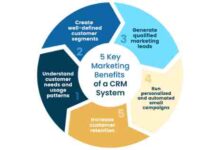In today’s fast-paced business environment, sales automation tools have become indispensable for businesses looking to streamline their sales processes, boost productivity, and ultimately increase revenue. These tools leverage cutting-edge technology to automate repetitive tasks, improve customer engagement, and provide valuable insights for informed decision-making. If you’re looking to supercharge your revenue, here are 7 awesome sales automation tools that you need to know about.
CRM Software
Transform your sales process with Customer Relationship Management (CRM) software. A CRM system allows businesses to manage customer data, track interactions, and streamline sales activities. One of the key features of CRM software is lead scoring, which helps prioritize leads based on their likelihood of conversion. By assigning scores to leads based on predefined criteria such as engagement level, demographics, and purchase history, sales teams can focus their efforts on leads that are more likely to convert, maximizing their efficiency and increasing revenue.
Streamlining Sales Activities
CRM software streamlines sales activities by providing a centralized platform for managing customer data and sales pipelines. With a CRM system, sales teams can easily access customer information, track interactions, and monitor deals in progress. This eliminates the need for manual data entry and reduces the risk of errors or duplication. Sales representatives can quickly update deal status, add notes, and schedule follow-up activities, ensuring that no opportunity is missed and that the sales process flows smoothly.
Enhancing Customer Engagement
CRM software also improves customer engagement by enabling personalized interactions. With a holistic view of customer data, sales teams can tailor their communication to meet customers’ specific needs and preferences. They can track previous interactions, such as previous purchases or support tickets, and use this information to provide personalized recommendations or address specific concerns. By delivering a personalized experience, businesses can build stronger relationships with customers, increasing their loyalty and ultimately driving more revenue.
Email Marketing Automation
Email marketing automation tools take your email campaigns to the next level by allowing you to create personalized email sequences, send targeted messages, and automate follow-ups. These tools enable businesses to nurture leads through automated email workflows, delivering relevant content at the right time to move leads further down the sales funnel.
Creating Personalized Email Sequences
With email marketing automation tools, businesses can create personalized email sequences that are triggered based on specific actions or behaviors. For example, when a lead signs up for a newsletter, an automated welcome email can be sent to introduce them to the brand and provide valuable information. As the lead engages further with the brand, additional emails can be triggered, offering relevant content or special promotions. By delivering timely and personalized emails, businesses can nurture leads and increase the chances of conversion.
Targeting Messages Based on Customer Behavior
Email marketing automation tools also allow businesses to target messages based on customer behavior. By tracking how leads interact with emails, such as open rates or click-through rates, businesses can segment their email lists and send targeted messages to specific groups. For example, if a lead clicks on a specific product in an email, they can be added to a segment that receives follow-up emails highlighting that product’s features or offering a special discount. This level of personalization increases engagement and improves the likelihood of conversion.
Automating Follow-ups
Follow-up is a critical aspect of the sales process, and email marketing automation tools make it easier and more efficient. By automating follow-ups, businesses can ensure that leads receive timely and relevant information without requiring manual intervention. For example, if a lead downloads a whitepaper from a website, an automated follow-up email can be triggered a few days later to check if they have any questions or need further assistance. This automated approach saves time for the sales team while maintaining consistent and timely communication with leads.
Sales Funnel Automation
Sales funnel automation tools help businesses optimize their sales funnels by tracking and managing leads at every stage. These tools provide real-time analytics, automate lead scoring, and enable effective lead nurturing, ensuring that potential customers are effectively guided through the sales process.
Tracking Leads at Every Stage
Sales funnel automation tools provide businesses with a clear view of leads at each stage of the sales process. From lead generation to conversion, these tools track leads’ progress, enabling sales teams to identify potential bottlenecks or areas that need improvement. By monitoring the movement of leads through the sales funnel, businesses can identify trends and make data-driven decisions to optimize their sales strategies, ultimately increasing revenue.
Automating Lead Scoring
Lead scoring is a crucial process that helps businesses prioritize leads based on their likelihood of conversion. Sales funnel automation tools automate lead scoring by assigning scores to leads based on predefined criteria, such as engagement level, demographics, or firmographic data. This automation ensures consistency and accuracy in lead scoring, allowing sales teams to focus their efforts on leads that are most likely to convert. By prioritizing high-scoring leads, businesses can optimize their resources and increase the efficiency of their sales efforts.
Effective Lead Nurturing
Lead nurturing is a vital part of the sales process, and sales funnel automation tools make it easier and more effective. These tools enable businesses to automate lead nurturing activities such as sending targeted emails, scheduling follow-ups, or providing relevant content. By nurturing leads with timely and personalized interactions, businesses can build trust, educate potential customers, and move them closer to making a purchase. Effective lead nurturing increases conversion rates and boosts revenue.
Social Media Automation
Social media automation tools are designed to enhance a business’s social media presence and engagement with potential customers. These tools enable businesses to schedule posts, monitor mentions, and analyze social media metrics, maximizing their reach and impact on social platforms.
Scheduling Posts
Social media automation tools allow businesses to schedule posts in advance, ensuring a consistent presence on social media platforms. With these tools, businesses can plan their content calendar, create and schedule posts for specific dates and times, and even automate the posting process. By scheduling posts in advance, businesses can save time and effort while maintaining an active and engaging social media presence.
Monitoring Mentions and Engagements
Social media automation tools also help businesses monitor mentions and engagements across different social media platforms. These tools provide real-time notifications or reports whenever the business is mentioned or engaged with on social media. By staying on top of social media interactions, businesses can promptly respond to comments, engage with their audience, and address any concerns or inquiries. This proactive approach to social media management enhances customer satisfaction and strengthens the brand’s reputation, ultimately leading to increased revenue.
Analyzing Social Media Metrics
Social media automation tools offer comprehensive analytics and reporting capabilities, allowing businesses to track and analyze social media metrics. These tools provide insights into key metrics such as follower growth, engagement rates, or click-through rates, helping businesses understand the effectiveness of their social media strategies. By analyzing these metrics, businesses can identify trends, optimize their content, and make data-driven decisions to maximize their social media impact and drive revenue.
Proposal and Contract Automation
Streamlining the creation and management of proposals and contracts is essential for an efficient sales process. Proposal and contract automation tools help businesses automate these processes, saving time and ensuring consistency and accuracy.
Creating Professional Templates
Proposal and contract automation tools allow businesses to create professional templates that can be customized for each specific deal. These tools provide a range of pre-designed templates that can be easily modified to include relevant information, such as pricing, terms, or deliverables. By using professional templates, businesses can ensure consistency in their proposals and contracts, projecting a polished and professional image to potential clients.
Automating Document Generation
Automating document generation is a significant time-saver for businesses. Proposal and contract automation tools enable businesses to automate the process of generating proposals and contracts by populating templates with relevant information. By integrating with CRM systems or other data sources, these tools can automatically pull in customer information, product details, or pricing data, significantly reducing the time and effort required to create customized proposals and contracts.
Tracking Document Status
Tracking the status of proposals and contracts is crucial for effective sales management. Proposal and contract automation tools provide businesses with real-time visibility into the status of each document. Sales teams can see when a proposal or contract has been sent, opened, or signed, allowing them to follow up at the right time and move deals forward. This visibility improves communication within the sales team and with clients, ensuring that no document falls through the cracks and helping businesses close deals faster.
Sales Performance Analytics
Gaining valuable insights into sales performance is essential for optimizing strategies and driving revenue growth. Sales performance analytics tools provide businesses with comprehensive analytics and reporting capabilities, allowing them to track key metrics, generate detailed reports, and visualize data.
Tracking Key Metrics
Sales performance analytics tools enable businesses to track key metrics related to their sales performance. These metrics may include revenue generated, conversion rates, average deal size, or win/loss ratios. By tracking these metrics over time, businesses can identify trends and patterns, allowing them to make data-driven decisions to improve their sales strategies and drive revenue growth.
Generating Detailed Reports
Sales performance analytics tools offer the ability to generate detailed reports that provide a comprehensive view of sales performance. These reports may includemetrics such as sales by region, sales by product, or sales by sales representative. By analyzing these reports, businesses can gain insights into the performance of different segments of their sales team or identify areas of improvement. Detailed reports help businesses understand their strengths and weaknesses, allowing them to make informed decisions to optimize their sales strategies and increase revenue.
Visualizing Data
Sales performance analytics tools often include data visualization capabilities, allowing businesses to visually represent their sales data. Visualizations such as charts, graphs, or dashboards provide a clear and intuitive way to understand complex data sets. By visualizing data, businesses can quickly identify trends, patterns, or outliers, enabling them to take action and make data-driven decisions. Visualizations enhance the accessibility and usability of sales data, making it easier for businesses to identify opportunities for revenue growth.
Chatbot Automation
Chatbot automation tools are designed to enhance customer experience and improve lead qualification through automated interactions. These tools enable businesses to automate customer interactions, provide instant responses to inquiries, and qualify leads based on predefined criteria.
Automating Customer Interactions
Chatbot automation tools allow businesses to automate customer interactions, providing instant responses to inquiries or frequently asked questions. By leveraging pre-defined responses and natural language processing capabilities, chatbots can engage with customers in a conversational manner, simulating real-time interactions. Automating customer interactions not only improves response times but also ensures round-the-clock availability, enhancing customer satisfaction and driving revenue.
Providing Instant Responses
Chatbots excel at providing instant responses to customer inquiries, eliminating the need for customers to wait for human assistance. By leveraging artificial intelligence and machine learning algorithms, chatbots can understand customer queries and provide relevant and accurate responses. Instant responses not only improve customer experience but also help businesses capture leads and drive conversions. By addressing customer queries promptly, businesses can build trust and establish themselves as reliable and responsive, ultimately leading to increased revenue.
Qualifying Leads Based on Predefined Criteria
Chatbot automation tools can also qualify leads based on predefined criteria. By asking a series of questions and collecting relevant information, chatbots can assess the quality of leads and determine their readiness for further engagement. For example, a chatbot may ask about a lead’s budget, timeline, or specific requirements to determine if they are a good fit for the business’s products or services. By automating lead qualification, businesses can focus their efforts on leads that are more likely to convert, improving efficiency and driving revenue.
Sales automation tools are essential for businesses looking to supercharge their revenue. From CRM software to chatbot automation, these tools streamline processes, improve customer engagement, and provide valuable insights for informed decision-making. By leveraging these 7 awesome sales automation tools, you can optimize your sales efforts, drive conversions, and achieve remarkable revenue growth. Embrace the power of automation and take your sales game to new heights!



